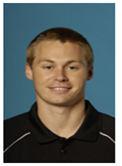by Art Horne
Working with Basketball at Northeastern University since 2003 I’ve been fortunate enough to work with some very talented “mid-major” players who have gone on to earn money in the NBA, NBA-D league and overseas. But being a mid-major player automatically stacks the deck against you when it comes to visibility and recognition, and when “interview” time comes, every little advantage counts when it comes to making an NBA roster.
I asked three presenters from this year’s Basketball Symposium and former NBA strength coaches what a mid-major player needs to do to crack a roster spot.
Here are their responses:
 Charlie Weingroff, formally of the Philadelphia 76ers
Charlie Weingroff, formally of the Philadelphia 76ers
1. Don't be a dick.
--In the NBA, the only thing that matters is if you can fill up the stat sheet. If you can put the ball in the goal, dish out or board double digits, or lock somebody up, you can act however you want. The better you are, the more leeway you have in how you conduct yourself. Hopefully this isn't too much of a surprise. But the lower down the totem pole you live, the less tolerance for foolishness there is. Every team needs to have 15 guys. It is not an insult to be number 15, but the truth of the matter is that there are more guys that be number 15 than can be 1 or 2. Don't dress crazy. Don't talk ghetto. Don't ask the equipment guy for the 4th t-shirt. Be early and don't give staff any trouble. Just show up and play hard. Don't be noticed for anything except the court, and be a good person (even if you're not in real life).
2. Know the plays
--Summer League has plays just like the regular season. And a lot of the plays are designed for the young guys that are guaranteed, not the guys trying to get a look. Summer League is more for them than anybody else. So if you screw up the plays or break the plays trying to get yours, that will piss coaches off. Even if you knock down shots, if you don't let the play run through, or screw up the motion, that is a very easy way to stand out in a negative way.
3. Respect the staff's time
--Don't think for one second that the front office and coaches don't ask the trainers, strength coaches, and equipment guys, even the ballboys about players. When there are tie breakers to be had, how players treat co-workers is on the report card. If you are trying to do whirlpools after practice and get in extra workouts, you are probably pissing off the staff that works 100 hour weeks all year and wants to get home to their families and time off. It may suck that you want to do everything you can to make the best of your opportunity, but remember that Summer League isn't as much about the long shots as it is about showcasing and exposing the guys already in the mix. If rehab and training sessions are not part of the schedule, ask in a very non-entitled way the trainer or strength coach if we do anything like that in summer league. If the Strength Coach says, oh yeah, sure, then you're fine. If the Strength Coach says, you know, we don't really do much of that in the summer, or we just do that with the guys on the team for now, then don't get pissy and just show up and play hard the next day. Maybe the hotel has a whirlpool or gym you can get your work in. It might suck or not make sense, but welcome to NBA Summer League. It ain't about you.
4. Eat right
--2-a-days and the heat of Vegas or Orlando along with playing with the best competition of your life may be some of the biggest physical challenges your body has endured. McDonald's is not the premiere choice to refuel your body. Spend some money, maybe more than you would prefer to eat better. Put down as much water as possible, and if you have a history of cramping, take more Gatorade or if there are any Gatorlytes added to the water or drinks. Salt your food unless you have a condition that says this isn't a good idea. There will typically be "nutrition" bars available, and they are probably better calories than most college athletes are used to getting when left to their own devices.
5. Defend
--Defending takes heart and commitment. This is what can separate you from other guys with even better talent and skills. There is always room for guys that can defend. As a strength coach and athletic trainer, it is hard for me to comment or really know how to teach defense. I guess you just know it when you see it. It is being in great condition when you show up to Summer League and being very active with your hands and staying with your man's hips. Miyagi said, "Always look eye," but I think in basketball you always look hips. The hips don't make fakes. Eyes, head, feet can all make fakes, but not the hips and midsection. Defense always gets noticed.
 Keith D’Amelio, Stanford University, Formerly of the Toronto Raptors
Keith D’Amelio, Stanford University, Formerly of the Toronto Raptors
1)Do the little things on the court
There are only so many shots to go around over the course of a game and more often than not someone who makes a lot more money than you is paid to take them. Where you can have an impact and be an asset to your team by doing the little things - Making the extra pass, putting a body on someone, fighting for loose balls, setting good screens. Most players don’t like to hear this as they think they are Kobe or LeBron and can all score 30 points any night. The reality is you are not, but that doesn’t mean you cannot help an NBA team win.
2) Do the little things off the court too
How you act, how you treat people within each organization can have a dramatic effect on your potential longevity in the NBA. NBA GM’s can be somewhat handcuffed by some players and their attitudes due to their overwhelming talent. They however do not have to put up with a bench player causing problems. If a superstar makes 20 million a year and is an ass, it is very tough for most GM’s to do something about it. If the 13th man is a jackass and causes problems, it doesn’t take much for an NBA team to pay a few $100,000 to quickly get rid of a problem. I have personally had to deal with players we brought in for the draft who were complete assholes, when the GM asked me my opinion I was nothing but honest and probably effected his potential draft status – he went undrafted. When you walk into a room, say good morning, thank the staff for things they do for you. They may be getting paid to perform a job but they are often way overworked and way underappreciated – don’t be one of the people who under appreciates them.
3) Equipment Man Rules ALL
This is someone who you have to befriend. They often run a lot more than simple laundry, and are almost always close with the GM. Treat them poorly or cause them problems and it will really bite you in the ass. Don’t ask for a new pair of socks every day, make sure your gear is always pinned or put in the bag, asking for 10 t-shirts for your friends is not going to go over well either. These guys will be more than happy to help you any way they can as long as you’re not an ass and help to make their jobs easier.
4) Take care of your body – you’re not going to play forever.
Most young players and rookies think they will play forever and have this incredible athletic talent until they are 60. Sorry to tell you but you won’t. What you do today can affect how you play in 10 years. Don’t think for a second that eating nothing but fast food is good for you or is helping you perform at your best. It probably wouldn’t make sense if I told you that Dale Ernhart Jr puts 87octane is his race car, so why would you think it’s ok for you to put a 99 cent value meal into your body – which is essentially your race car.
5) You’re not a 10yr Vet – don’t try and act like one
Hopefully you’re lucky to make it onto a roster, but please do not get caught up in trying to keep up with the vets – they have earned certain rights and have a lot more money in the bank than you do. I have seen it time after time with rookies who try and keep up with the team vets; trying to go shopping with them, buy clothes, buy cars, jewelry, etc. While yes you now make a tremendous amount of money – it is often nothing compared to what some of these vets make and have made for several years. Also vets are often quite able to go out at night and then be ready for practice the next day. Rookies often can’t handle it and will quickly put themselves in bad situations, both financially and on the court trying to keep late hours. Always keep in the back of your head too, that these Vets who are taking you all night and going shopping know one thing – they can’t play forever and some of you rookies are their potential replacements. So what appears to be a Vet taking care of some rookies may have underlying tones. Have fun and enjoy but remember you have a job to do.
 Mike Curtis, University of Virginia, formally of the Memphis Grizzilies
Mike Curtis, University of Virginia, formally of the Memphis Grizzilies
1) Know Your Strengths and Weaknesses
The most important quality any athlete or human being for that matter can posses is “humility”. Most undrafted athletes approach making an NBA roster the wrong way. They assume that scoring points is the single most important statistic that will get them an opportunity to sign a contract. There are three sayings that should be posted at the entrance of the locker room door during pre-draft workouts and summer league camps.
“Know who you are!”
“Know what got you here!”
“Do what you do!”
General managers and coaches typically select players for workouts and summer league based on scouting efforts throughout the year. If you were known in college for being a rebounder you should probably focus on rebounding. If you were known as a defender you should probably stop your opponent for scoring. I can’t tell you how many meetings I sat in on where a GM said to a scout after a workout or summer league game, “I thought you said this guy was this or that. I haven’t seen him stay in front of a guy yet or grab more than 2 rebounds in a game. “.
Every team has a niche to fill and most times the scoring need is filled by the guy they drafted in the first round. So stop listening to friends, parents, and in some cases uniformed agents and stick to your strengths. Your weaknesses can be addressed in practice or the off-season once you sign a contract. Your chances of making a team will increase if you do what the front office expects you to do first and foremost. An ability to score on top of that is a bonus.
2) Know What Your Goals Are and How to Actually Achieve Them
Making an NBA roster as an undrafted free agent is an extremely difficult task. In point number one I spoke about knowing your strengths and weaknesses. Then playing to those strengths. More importantly, it’s imperative that you put yourself in situations where you realistically have a chance to make a team and show your talents.
Some players simply want to increase their marketability and earning potential for opportunities overseas and training camp invites are beneficial. However, if your true and realistic goal is to make an NBA roster make sure that your agent is on the same page. What sense does it make to go into a training camp if you’re a wing position and the team already has 4 wings under contract for the next 2 to 3 years?
In rare cases the chance to showcase your talents in pre-season games or summer league may spark interest from another team. In most training camp situations you are just a practice dummy, there to take repetitions while the guaranteed guys take their time getting into shape.
Look for situations where you can enter the gym each day feeling as if you have real opportunity to achieve your dream. It will do wonders for your level of effort and mental approach.
3) Make Sure You are Physically Prepared the Grind
The pre-draft workout circuit is grueling. It usually consists of arriving in a city the night before. Working out the next morning. Heading to the airport after the workout and then boarding a plane for the next city and doing it all over again in the next place. If you aren’t a guy projected to go in the first round pencil yourself in for 10-14 consecutive days of this.
Summer league for most teams is 10-14 days in the worst possible destination for physically and/or mentally unprepared athletes. The temperature is usually well above 100 degrees Fahrenheit and the off court distractions are spectacular and plentiful.
In both of these situations you are not afforded an “off” day. That “off day’ could cost you money. So make sure you find a way to fuel your body for performance. That means hydration (water, Gatorade, etc) and complex carbohydrate dense meals. McDoanald’s, Wendy’s, and/or Taco Bell are hard places to find food for optimal performance. Additionally, get to bed and allow your body to recuperate.
Nutrition and rest are tried and true methods for recovery and given the amount of mental and physical stress associated with trying to make a team you will need as much of both as you can get.
4) Show Some Character!
Everyday is an interview for you. Your interactions with coaches, trainers, managers, and even friends will be investigated or analyzed on some level. Calls will be made to the support staffs of your college. A general manager will ask his athletic trainer, strength coach, and equipment manager about their interactions with you. From the time you put on a uniform in high school until signing day will be up for review if a team is interested in your services.
Men of character who can fill a need within a team have much higher chances of making a roster. Owners and front office personnel are getting tired of embarrassing off-court incidents. Society and front offices will give “first-rounders” a pass on character issues because they can fill up stat sheets. Everyone else is on a short leash.
5) Play Hard! and Smart!!!
Front office personnel love guys who play hard. But they really hate guys who don’t play smart. Learn the offensive plays, learn the defensive rotations, learn/understand/except your role, and play with a purpose. Dive for loose balls. Run the floor even if you don’t get the ball. Get back on defense. Guard your man. Play team defense. Finish plays you’re supposed to finish offensively.
